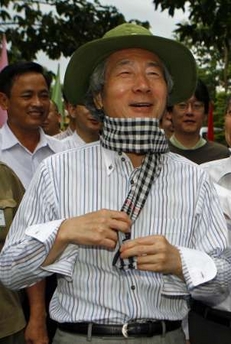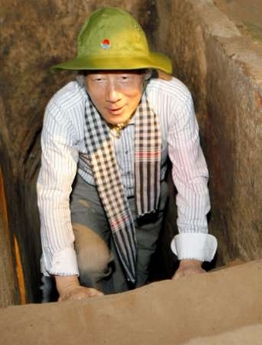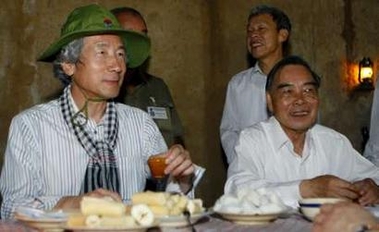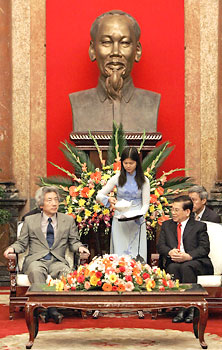Nikkei PC Magazine reports:
Arguments for Caution at Cultural Affairs Agency Deliberation Council on Copyright Term Extension Issue
May 16, 2007
The Subcommittee for the Protection and Use of Past Copyrighted Works Etc. of the Cultural Deliberation Council’s Copyright Commission, an advisory body to the Commissioner of the Cultural Affairs Agency on the copyright term extension issue, held its 3rd meeting of 2007 on May 16.
Continuing from the previous meeting, a hearing was held consisting of 17 people including stakeholders engaging in business activities related to copyright. This time, however, moderate-thinking lawyers and academics with a background in copyright made multiple arguments against term extension.
“Cases of Copyright Inheritance are Rare”
Professor Masaru Itoga (Library Information Science) of Keio University, pointed out that gaining permission to use copyrighted materials will become more difficult by extending the copyright term from 50 years after the death of the rights holder to 70 years. “With the exception of famous works, cases in which surviving family members inherit copyrights are rare. Also, finding the addresses of corporations is easy, but the contact information of individual rightsholders is not made public. If the copyright term is extended, there is a danger that there will be an increase in the number of works that are not passed on after the rights holder’s death and it is unclear who holds the rights to them.”
[snip issue of “free use labeling”]
“The International Balance of Copyright is -600 Billion Yen Annually”
Attorney Kensaku Fukui commented that while the US, Europe, and Japan have extended copyright term repeatedly, copyright term has never been rolled back, and called for caution on a hasty extension: “The effects from term extension will felt by posterity semi-permanently. I hope for and will watch carefully for a debate that will stand up to historical investigation, showing who and with what proof did people favor, oppose, or remain silent on extension.”
He went on to question: “Those in favor of term extension argue that if a database for copyrighted works is built then past works can be easily accessed. I think there is merit in that idea, but it would be difficult to create a database comprehensive enough to cancel out the problems posed by extension. The list of authors tops 790,000 just based on the archives of the National Diet Library. Extend that to overseas works and a database would grow exponentially in size if the copyright term is extended to 70 years retroactively. Are we going to place this cost on the Japanese people?”
Fukui also commented on the fact that according to Bank of Japan statistics, Japan’s international balance of payments for copyrighted works is negative 600 billion yen annually (meaning that more copyrighted work is imported than exported) and is growing year by year: “If prewar Western works’ copyrights continue to be extended, then over-importing and the international uneven distribution of intellectual property will become permanent. There are those who argue that ‘extension is necessary to protect the works of Haruki Murakami or Japanese animation,’ but these works’ copyrights will last for at least another 30 years. The decision to extend works such as those should be made based on the situation 30 years from now, and it is no reason to extend copyright term now. I think we should stop immediately trying to find a way to cooperate whenever we are told something by the US and Europe.”
“Economic effects of term extension no greater than 1-2%”
Keio University Professor Tatsuo Tanaka (Econometrics) claimed that the economic effects of term extension would be small and that the rational decision would be to promote use of the public domain. Tanaka explained his doubtful outlook: “Citing books with past case studies, the increase in revenue for rights holders due to copyright term extension would be only 1-2% of all copyright revenue. Will raising royalties from 10% to 10.2% actually boost creativity?”
Meanwhile, arguing that the term extension is set aside would allow works to be used freely in the public domain, Tanaka concluded that not extending copyright would be better for society: “Businesses that promote new uses by exploiting the public domain are increasing. For example, Aozora Bunko boasts a lineup of 6000 titles, and the top 1000 titles are viewed by 4.5 million people per year. Cheap DVDs sell 1.8 million copies per year. There are also many examples where works whose copyright terms have expired, such as Akira Kurosawa’s Rashomon and Ayaka Hirahara’s Jupiter, have been recreated. On blogs and social networking sites, 10 million average citizens are creating and transmitting content. The public domain is the lifeblood of creativity for the next generation, and forms the basis for the average person’s creations.”
Other participants arguments’ included “I am negative on term extension, but even if the term is extended, I hope that the part of the term beyond 50 years will require a notification and that the term will not be categorically extended.” (Keio Univ. Associate Professor Kim Jong Kun [金正勲]), “As a part of a system for notification of intent, I would like a free use label to be created that indicates permission to freely use work in a museum.” (Akira Inoue, Director General of the National Science Museum)….. “Ryonosuke Akutagawa worried whether people would read his work 50 years in the future. The greatest hope of a creator is to have his/her work read by a great many people. Extending copyright term would decrease the opportunities for works to be used and lead to a cultural loss.” (Authoer/poet Chico Ryomi).
Still others’ contended: “For orchestras, the burden from usage fees they will pay to JASRAC due to term extension is a serious issue.” (Japan Orchestra Federation Standing Director Naomoto Okayama), “It is almost inconceivable that software will be used 50 years after [its copyright holder dies], making term extension unrealistic.” (Association of Copyright for Computer Software Executive Director Hiroshi Kubota)
Others Argue “We Should Lead the International Current”, “National Cultural Assets will be Lost”
Meanwhile, there were also arguments in favor of term extension, mostly from officials from rights holder groups. Hide Ikuno, Executive Director of the Recording Industry Association of Japan, noted that “copyright term for records is already greater than 50 years in 21 countries. Japan has the second largest record sales in the world, and is in a position to lead the international current.”
Kazuhiko Fukuodera, standing director of the Japan Artist Association, argued: “Edvard Munch is still copyrighted in the West but is public domain in Japan. When that happened, dolls parodying “The Scream” went on sale. We should not do things that are rude to creators. In 2009, Taikan Yokoyama’s copyrights will become public domain. The Taikan Yokoyama Memorial Center’s operating costs are taken care of in part by copyright fees, and if they become public domain the operations of the center could become difficult, leading to a loss of national cultural assets.
(by Kanto Kaneko)
Comment: Some things to be learned from/noted about this article:
1. Those who will benefit from copyright extension in Japan are overwhelmingly foreign rightsholders, such as the Beatles, Elvis, Disney and other popular foreign artists/movies.
2. The arguments for copyright extension, when shown in the light of day, are extremely weak (lead by following?!) and hold no legal water unlike the previous extension to 50 years to comply with the Berne convention.
3. The Japanese system of public hearings before advisory committees long before any cabinet decisions are made or laws passed can work much much better than, say, the American system in which copyrights can be extended through the sheer political will of Sonny Bono’s widow and Disney. This did not stop the copyright term for movies from being extended to 70 years after the rightsholder’s death due to foreign pressure from the US etc, but an increasingly copyright-conscious Japanese public may just save Japan as a bastion of consumer-friendly copyright term.
4. The bulk of the Japanese media, as major rightsholders themselves, spew endless anti-piracy, pro-rights management propaganda, though as you can see this is not always the case as there are opposing business/consumer interests involved. I’ll try and locate a good example sometime soon.





